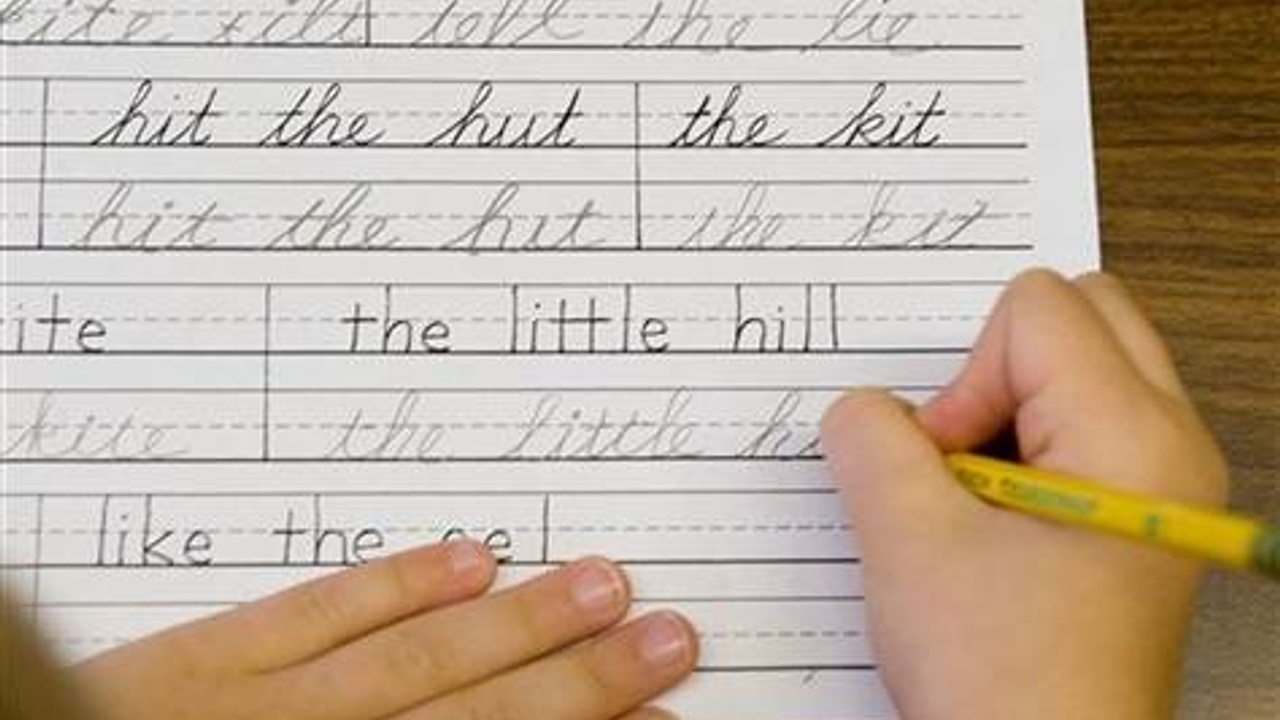Tossing the Baby out with the Bathwater, or Are We?
Ahh, the final debate. As this was also my own debate, I was surprised to discover how stronly I believe we need to stop teaching skills that technology can do with ease. Initially, I was not convinced. I was aware that, as teachers, our time in the classroom is limited, and it’s wasteful to devote hours to mastering cursive writing, memorizing multiplication tables, or drilling spelling when technology performs these tasks faster and more accurately. But, as my colleagues would argue, are these not necessary building blocks to further learning? Let’s explore that concept in more depth.

Cursive Writing? Let’s Stop Wasting Everyone’s Time
Let’s begin with the dreaded and entirely irrelevant cursive, in an era dominated by digital communication, I believe that continuing to devote precious classroom hours to cursive writing is a misuse of educational time and resources. Did the class concur? Heck no! However, there are many supportive arguments that cursive has now become an antiquated practice that is no longer necessary in this digital age. It has lost it’s function and place in our digital world. It’s often argued that cursive helps with fine motor skills and brain development, but research shows those benefits can be gained from other forms of handwriting, including printing. I have yet to hear a convincing argument of why we should still be teaching this!

A study published in Psychological Science (Mueller & Oppenheimer, 2014) showed that taking notes by hand—not necessarily in cursive—improved learning and retention. The advantage was in the process of handwriting, not the style. Why are we wasting time that should be spend preparing our learners for their future employment and the real world around them? Some could argue that we are still teaching relevent keyboarding skills with cursive so there is not need to remove cursive from our teaching. According to a review by the American Handwriting Analysis Foundation, schools spend an average of 60 instructional hours teaching cursive by grade 5, while typing instruction often receives less than 10 hours.

Cursive can enhance digital communication and overall productivity and it is absurd to desperately hold on to teaching from the past. As we mentioned in our debate, we need to focus on digital literacy and let go of outdated practices.
Multiplication Tables, a Rote Learning Nightmare
At this point, I believe my nontraditionalist argument is rapidly becoming somewhat superflous but, while numeracy is vital, rote memorization of times tables takes valuable time away from building mathematical reasoning, problem-solving, and digital literacy, all skills that are far more aligned with modern life and workplaces. Rote memorization can actually discourage deeper engagement and reduce mathematical confidence. As Jo Boaler, Professor of Mathematics Education, Stanford University (2015) stated in Fluency without Fear, any classrooms focus on math facts in unproductive ways, giving students the impression that math facts are the essence of mathematics, and, even worse that the fast recall of math facts is what it means to be a strong mathematics student. Both of these ideas are wrong and it is critical that we remove them from classrooms, as they play a large role in the production of math anxious and disaffected students. As more studies are completed, it is becoming more and more difficult to argue that teaching multiplication tables are a necessary component of education. Drilling students on basic math facts and the memorization of assigned algorithms for the past several decades has overwhelmingly killed interest in mathematics, hampered intellectual development and misused teaching opportunities.

Spelling Skills, More Like Spelling Kills
So maybe that is a wee bit dramatic but it get’s to the heart of the matter. Spelling drills and rote learning are killing student engagement and overall enthusiasm and interest in learning and, again, is a practice in unnecessary and obsolete teaching methods. Weekly spelling tests, rote memorization and endless word lists are all ineffective tools that need to be abolished for once and for all. We live in a new age of predictive text, autocorrect, and a plethora of digital writing tools. For students with dyslexia or other learning differences, repetitive drills can be demoralizing and ineffective. With a deeper understanding of how children learn language effectively, we need to let go of these archaic relics of the past and focus on meaningful literacy experiences, pattern recognition, and strategic editing.

As Brianne and I posited, overall education should focus on critical thinking, problem-solving, digital literacy, and adaptability because these are the actual skills that prepare students for a world where AI and automation are part of everyday life. Surprisingly, for such a tech promoting class, the majority of our class would disagree; however, clinging to outdated practices holds students back from more relevant, future-oriented learning. It’s time we rethink these archaic foundational skills and ensure students are learning while engaged in important and meaningful learning that will prepare them for the world to come. If children are the future, let’s get real and prepare them for such.

One thought on “Tossing the Baby out with the Bathwater, or Are We?”
Hi Rose,
Thanks for sharing this inciting critique of the education status quo, especially how we persist in teaching fundamental skills that technology has rendered “less fundamental.” Your points, while compelling, slightly oversimplify the complex roles fundamental skills play in cognitive development. Cursive, though argued as anachronistic, research in educational psychology shows it can reinforce neural pathways and fine motor control. Similarly, math memorization enables cognitive fluency that supports problem-solving at higher levels. I am a proponent of digital literacy, but I find these basic skills necessary for technological progress and proficiency.
Far from being presented as mutually exclusive, I advocate for a more integrated approach to education. To keep the dialogue going, in what ways can we ensure that, as we reject outdated practices, we do not neglect the developmental benefits these fundamental skills can still offer in early childhood?